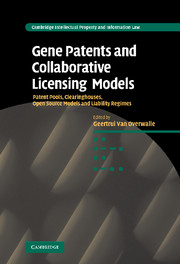 Gene Patents and Collaborative Licensing Models
Gene Patents and Collaborative Licensing Models from Part V - Different perspectives
Published online by Cambridge University Press: 14 January 2010
Introduction
Competition law is not at the centre of the present book. It comes in as an additional concern, influencing the search for proper models for solving a problem of patent abundance, whose contours, however, are not yet well realized and recognized in biotechnology. Like in other areas of advanced technologies, the basic assumption is that the field is crowded by a large number of patents, with ownership being dispersed among many patentees, so that it becomes impossible for anyone to work naturally coherent pieces of the technology without first obtaining consent by many other patentees. Seeking such consent may delay innovation, and raise its costs as royalties may have to be paid. It also entails transactions costs relating to the search of relevant patents and patentees, to determining the patents' value, and to negotiating license agreements, provided always that an agreement may be found.
In the present volume, a large variety of models has been presented, which either seek to avoid or to overcome the problem resulting from the fragmentation of technologies into pieces of proprietary knowledge. In a competition law perspective, this by itself represents quite a remarkable merit of this volume, since it opens the view for a number of options among which to choose when looking for a “pro-competitive” or, at least, for a non anticompetitive solution of the problem. However, for the commentator, it creates an embarras de richesse.
To save this book to your Kindle, first ensure [email protected] is added to your Approved Personal Document E-mail List under your Personal Document Settings on the Manage Your Content and Devices page of your Amazon account. Then enter the ‘name’ part of your Kindle email address below. Find out more about saving to your Kindle.
Note you can select to save to either the @free.kindle.com or @kindle.com variations. ‘@free.kindle.com’ emails are free but can only be saved to your device when it is connected to wi-fi. ‘@kindle.com’ emails can be delivered even when you are not connected to wi-fi, but note that service fees apply.
Find out more about the Kindle Personal Document Service.
To save content items to your account, please confirm that you agree to abide by our usage policies. If this is the first time you use this feature, you will be asked to authorise Cambridge Core to connect with your account. Find out more about saving content to Dropbox.
To save content items to your account, please confirm that you agree to abide by our usage policies. If this is the first time you use this feature, you will be asked to authorise Cambridge Core to connect with your account. Find out more about saving content to Google Drive.